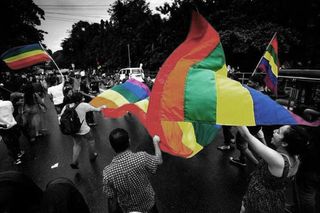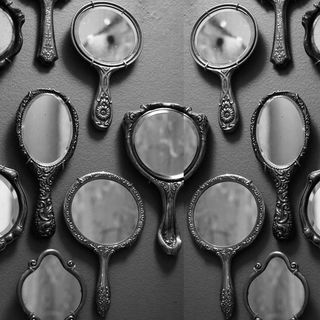
One Year Since the Section 377 Verdict, What Has Changed?
“A year ago, even in all that euphoria, I knew it was just the beginning.”

Imagine a bird in a cage that is suddenly set free. It won’t fly out straight away. It will look around first, try to make sense of its surroundings, because all the years of captivity have left it confused, unaware of where to fly or how to get to wherever it wants, said Ashok Row Kavi, the founder of LGBT rights group, Humsafar Trust.
One year ago on September 6, the Supreme Court scrapped the part of the colonial-era Section 377 of the Indian Penal Code that criminalized homosexuality, decreeing consensual sex between same-sex partners not criminal. Since the reversal, the queer community can be likened to the hypothetical bird, according to Row Kavi, who is also one of the petitioners who rallied to repeal Section 377 and the first Indian man ever to have declared his homosexuality via the media to the mass public. The community has the freedom but is unsure what to do with it, Row Kavi said.
For Jasmine, 23, from Punjab, the Section 377 verdict meant it would be easier to be part of the queer community, that it would be safe to be queer in public. Before, “at the back of my mind, I always had this fear that what if people take offense to [my sexuality], what if people try to kill me, what if people try to set me up and throw me in jail. The government’s not even on our side, anything could happen,” she said. But after, “I felt a little bit more relieved because I felt at least the law is on our side now,” Jasmine said, adding it was relieving. Even though it is easier to speak openly and talk about queer rights now, she doesn’t see people doing it much, Jasmine adds.
The decriminalization of homosexuality accorded India’s queer community the freedom to exist safe from prosecution and gave them the right to have sex. But it did little else. Now, it needs to be used as a launching point to fight for other civil rights, Row Kavi said — the right to marry, adopt and engage a surrogate; the right to insurance coverage for same-sex partners, the right to inherit, among several others. Without spending time and effort to realize these rights, the queer community will continue to the bird who doesn’t know how to fly out of the cage.
Related on The Swaddle:
It’s Time For a Corporate India to Catch Up to a Post-377 World
One year later — even as pop culture embraces the constitutional acceptance of queer bodies in movies such as Ek Ladki Ko Dekha Toh Aisa Laga, society has barely caught up to accepting homosexuality, and the laws to enforce queer acceptance at institutional levels are even farther behind.
More than the Supreme Court ruling last year, Row Kavi believes the 2009 Delhi Court judgment that scrapped Section 377 because it violated the fundamental, constitutional rights to life, liberty, and equality — unfortunately reversed by the Supreme Court in 2013 — was more of a gate opener for the queer community. “The SC judgment is a rah-rah statement from the judges,” Row Kavi said, whereas the 2009 Delhi Court judgment was more comprehensive and sought to protect more queer rights, such as the right to privacy. The Supreme Court ruling falls short of according non-sexual rights to queer people, which is all the more reason to reform civil society, along with laws, to realize rights for the queer community. From being inclusive of transgender people in workplaces to a lesbian couple getting a joint bed at hotel rooms to unisex uniforms in schools to implementing inclusive sex education in schools — “it’s a constant battle,” Row Kavi said, adding “we need a complete reorientation in society.”
The Supreme Court verdict left out many rights queer people deserve, and the legal acceptance of homosexuality itself will need to be implemented at a societal level, according to Chitra Palekar. Palekar, the parent of a lesbian daughter, signed the Supreme Court petition that brought down Section 377 and is one of the founding members of Sweekar, an advocacy organization that brings together and educates parents of queer individuals. “What I felt at that time was [the repeal of 377] was an end to a very long fight. I thought, ‘Our children will not be considered criminals,'” the 72-year-old said. However, “a year ago, even in all that euphoria, I knew it was just the beginning. I have seen in my long life that judgments come, but they have to be put in practice. Otherwise, they remain documents only. If this judgment has to come into practice, it cannot remain a theoretical exercise.”
The prejudice that exists within Indian society wasn’t solely due to Section 377, Palekar said. Various institutions in the country need to be sensitized, including the police, bureaucrats, psychologists, lawyers, college professors, parents — these people have to support queer rights openly and make sure they talk to others about how to make sure queer people get equal representation and rights as heterosexuals. Sweekar has been doing this work, Palekar said, adding she saw an uptick in parents who reached out after the Section 377 verdict in an attempt to understand their queer children better and become better allies. “The [parents] wanted to truly understand what their children were going through, how their futures would be. The anxiety was a bit less [after the Section 377 verdict] and the parents became not just more curious, they were interested and now they could speak openly,” Palekar added.
There is still a long way to go. Right now, people tend to voice support for their queer family members in private, she said. The queer and ally communities need to fight loudly to make educational institutions and workplaces safe — only then will what people call the landmark judgment of 2018 be fully realized, Palekar said.
Related on The Swaddle:
Corporate Investment in Pride Increases Visibility, But Doesn’t Expand Rights
Atmadip Mukherjee, 21, from Jaipur, believes “changing laws and legislation does not imply that society has changed but it is the start. It kindles the flames of change only to be propelled by resilience, activism and all acts of bravery,” he said, adding, “The law is the backbone of society and it is what people turn to for support when they have been wronged or when all else fail. I am grateful to everyone who was involved in ensuring that we had the law on our side.”
Row Kavi and Palekar both stress this approach toward the Section 377 verdict: it’s important to look at the Section 377 verdict as a first step while keeping in mind the fight will have to endure. Just because homosexuality has been decriminalized, doesn’t mean it is automatically easier for queer people to function in society, and expectations need to be adjusted accordingly. Change is gradual; and all the rights that the queer community is deprived of, that are enthusiastically accorded to heterosexuals, can only be realized in time.
“Freedom is, after all, a gateway,” Row Kavi said. “It is not the end-all.”
Rajvi Desai is The Swaddle's Culture Editor. After graduating from NYU as a Journalism and Politics major, she covered breaking news and politics in New York City, and dabbled in design and entertainment journalism. Back in the homeland, she's interested in tackling beauty, sports, politics and human rights in her gender-focused writing, while also co-managing The Swaddle Team's podcast, Respectfully Disagree.
Related


People Recall the First Time They Felt They Weren’t Beautiful
